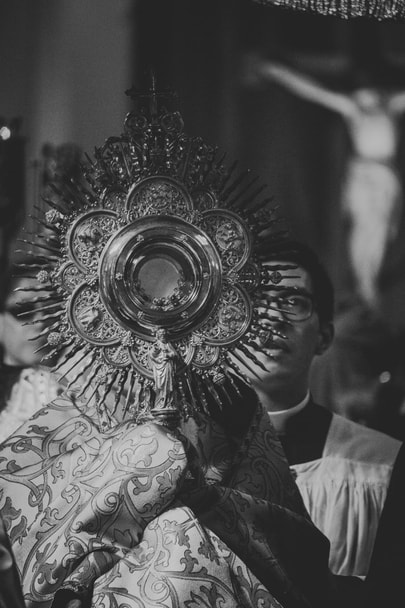
After Pentecost and Trinity Sunday, the Church celebrates two “feasts of the Lord,” which extend the glory of the Paschal Season into the year. These feasts Corpus Christi, which we celebrate today, and the Sacred Heart on Friday. Thus we conclude the great Paschal Season that we began on Ash Wednesday almost four months ago. We began by fasting on Ash Wednesday and we conclude by eating the Body and Blood of the Christ today. We enter now the “Sundays after Pentecost,” which will take us through the summer and autumn to the First Sunday of Advent this year on December 1st. We make our way to heaven within the mystery of Pentecost, in the age of the Holy Spirit, between the first and second comings of the Messiah. But it is the mystery of the Holy Eucharist, the Corpus Domini, that sustains us during our pilgrimage to eternity. The Holy Eucharist is the Most Blessed and Beautiful of all the Christian Mysteries. Adoration (a Latin word ad orem meaning “into the mouth,” the mouth of God!) brings us into God’s very being.
SS. John Fisher and Thomas More
Yesterday was also celebrated the Feast of SS John Fisher and Thomas More, martyred in 1535 by King Henry VIII. Of all England’s bishops, John Fisher was the only one to remain faithful to the Church in the face of the King’s apostacy. Thomas More, Henry’s own Lord Chancellor and the most brilliant mind in the realm, also refused the King’s declaration against the Church, saying famously at his trial: “I am the King’s good servant, but God’s first.” These men died rather than compromise the truth, whom they knew as a person, Jesus Christ, the Way, the Truth, and the Life. They echoed the serene faith that martyrs have made from the first centuries of Christianity. In the year 303 the Roman Emperor Diocletian made attending Mass a capital crime, just as Henry VIII did in England. One Sunday morning Roman soldiers arrived at the home of Emeritus, a Christian who had invited a priest into his home to offer the Holy Eucharist. The soldiers arrested 49 Christians and brought them before the local magistrate. “What did you not understand about the law?” he asked them. Emeritus famously replied to the judge: Sine Dominico Non Possumus. We can’t live without the Holy Eucharist. Life would be without purpose, without beauty, without goodness. We would have no reason to get up in the morning, to go to work, to be kind to our wives and children, to be honest in our business dealings. We would rather die. And they did die. The government put all 49 Christians to death in February of the year 304.
SB 360
Religious persecution is on the rise in our own time. Will there come a time when Mass will be illegal in our country as it was in 4th century Rome and 16th century England? Last week a large color ad in the SF Chronicle advertised a legal firm for clergy abuse cases. Certainly, abusive priests must be brought to justice, along with all other criminal public servants. But what graphics did the ad use to describe abusive priests? It portrayed a priest’s hands breaking the Holy Eucharist over a silver chalice. Why did they choose an image of the Holy Eucharist to portray a horrible crime? Accuse the priest, accuse the hierarchy, but don’t accuse the Blessed Sacrament! A bill is rapidly making its way through the CA legislature, SB 360, which will put a priest in jail if he refuses to tell what he has heard in sacramental confession. The absolute confidentiality of confessional prepares the soul to receive the Holy Eucharist. I will read a letter from our Archbishop on this in a minute. But realize that an attack on the Sacrament of Confession is an attack on the Sacrament of the Eucharist. The time will come when all Catholics will have to choose between peace with Christ or peace with this world. We will have to make the choice the bishops of England had to make in 1530, and the choice Christians had to make in 4th Century Rome.
Is Christ’s Body and Blood worth fighting for? Yes it is. Without the Eucharist we starve. The social order will collapse without this spiritual sustenance. So let us begin by coming back to Mass and adoration, because most of us have already lost faith in the Eucharist: only 20% of Catholics in San Francisco attend Mass anymore. A Catholic population that has lost its hunger for the Bread of Life will lose the Bread of Life. Its priests and its churches and its schools and hospitals will be taken away from them, and their culture will fail. Because: sine Domenico non possumus. We cannot live without the Lord’s Supper.


 RSS Feed
RSS Feed